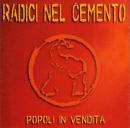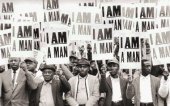My father, how long,
My father, how long,
My father, how long,
‘Fore we done sufferin’ here?
My mother, how long,
My mother, how long,
My mother, how long,
‘Fore we done sufferin’ here?
It won’t be long
It won’t be long
It won’t be long
‘Fore de Lord will call us home
We’ll soon be free
We’ll soon be free
We’ll soon be free
When Jesus sets me free.
We’ll fight for liberty
We’ll fight for liberty
We’ll fight for liberty
When de Lord will call us home.
My father, how long,
My father, how long,
‘Fore we done sufferin’ here?
My mother, how long,
My mother, how long,
My mother, how long,
‘Fore we done sufferin’ here?
It won’t be long
It won’t be long
It won’t be long
‘Fore de Lord will call us home
We’ll soon be free
We’ll soon be free
We’ll soon be free
When Jesus sets me free.
We’ll fight for liberty
We’ll fight for liberty
We’ll fight for liberty
When de Lord will call us home.
inviata da Pluck - 8/4/2024 - 21:31
Lingua: Italiano
"My Father, How Long?"
My father, how long,
My father, how long,
My father, how long,
Poor sinner suffer here?
My mother, how long,
My mother, how long,
My mother, how long,
Poor sinner suffer here?
And it won’t be long,
And it won’t be long,
And it won’t be long,
Poor sinner suffer here?
We’ll soon be free,
We’ll soon be free,
We’ll soon be free,
De Lord will call us home
We’ll walk de miry road,
We’ll walk de miry road,
We’ll walk de miry road,
Where pleasure never dies
We’ll walk de golden streets,
We’ll walk de golden streets,
We’ll walk de golden streets,
Of de New Jerusalem
My brudders do sing,
My brudders do sing,
My brudders do sing,
De praises of de Lord
We’ll fight for liberty,
We’ll fight for liberty,
We’ll fight for liberty,
When de Lord will call us home.
****
Versione da :
“ Slave Songs of the United States”
Allen,Williams Francis – NewYork 1867
section IV., #112
My father, how long,
My father, how long,
My father, how long,
Poor sinner suffer here?
My mother, how long,
My mother, how long,
My mother, how long,
Poor sinner suffer here?
And it won’t be long,
And it won’t be long,
And it won’t be long,
Poor sinner suffer here?
We’ll soon be free,
We’ll soon be free,
We’ll soon be free,
De Lord will call us home
We’ll walk de miry road,
We’ll walk de miry road,
We’ll walk de miry road,
Where pleasure never dies
We’ll walk de golden streets,
We’ll walk de golden streets,
We’ll walk de golden streets,
Of de New Jerusalem
My brudders do sing,
My brudders do sing,
My brudders do sing,
De praises of de Lord
We’ll fight for liberty,
We’ll fight for liberty,
We’ll fight for liberty,
When de Lord will call us home.
****
Versione da :
“ Slave Songs of the United States”
Allen,Williams Francis – NewYork 1867
section IV., #112
inviata da Pluck - 9/4/2024 - 13:16
×
![]()





Berea Songs of Slavery and Emancipation Ensemble
My Father, How Long? / We’ll Soon Be Free.
Two versions of the same song. First in TW Higginson* Army Life In A Black Regiment (pg. 169 XXXIV)
[For singing this “the negroes had been put in jail in Georgetown, S.C., at the outbreak of the Rebellion. ‘We’ll soon be free’ was too dangerous an assertion, and though the chant was an old one, it was no doubt sung with redoubled emphasis during the new events. ‘De Lord will call us home’ was evidently thought to be a symbolical verse; for, as a little drummer boy explained it to me, showing all his white teeth as he sat in the moonlight by the door of my tent, ‘Dey tink de Lord mean for say de Yankees.’”——T.W.H.]
second version, Slaves Songs of the United States, section IV., #112.
I made a composite lyric; music is based on that provided in Slave Songs of the United States.
from: Songs of Slavery and Emancipation, released June 17, 2022
by Mat Callahan / Various Artists
Double CD w/ Extensive Liner Notes
*Thomas Wentworth Higginson (1823 – 1911) was an American Unitarian minister, author, abolitionist, politician, and soldier. He was active in abolitionism in the United States during the 1840s and 1850s, identifying himself with disunion and militant abolitionism. During the Civil War, he served as colonel of the 1st South Carolina Volunteers, the first federally authorized black regiment, from 1862 to 1864. Following the war, he wrote about his experiences with African-American soldiers and devoted much of the rest of his life to fighting for the rights of freed people, women, and other disfranchised peoples.
Wikipedia